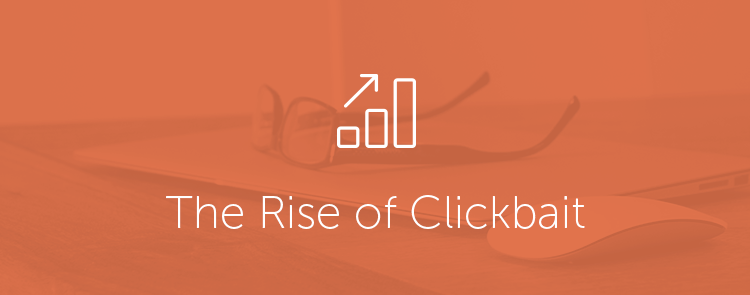If you’ve spent anytime on the internet the last few years, (and we’re guessing you have) you’ve likely seen thousands of clickbait headlines.
You know the ones…
Headlines that promise “you’ll never believe what happened next” are pretty common in this category. And the funny thing is, as you read these headlines you know they just want you to click, but despite all that you do it anyway.
Why?
Turns out, it all goes back to psychology. Shocking, right? There are a couple of psychological factors that are behind the reason why we just can’t resist click bait, despite our best intentions.
Curiosity

Ahh our old friend curiosity. In the study done by Professor George Loewenstein called the Psychology of Curiosity mentioned in this post, you’ll see that when we have our curiosity piqued, we are driven to reduce the knowledge gap or feeling of deprivation brought on by not knowing something.
That’s pretty powerful. Curiosity is basically like an itch that we just have to scratch, it makes us click on things we know aren’t all that useful, but feel compelled to find out.
In another study run by the BI Norwegian Business School in Oslo, researchers found headlines that ask questions had an average of 150% more clicks than a generic declarative headline. When the headlines had words like “you” in it, that number went up to 175% more clicks.
Emotions
It’s not just curiosity that drives clicking, it’s also emotion. A paper done by a group of researchers at the Federal University of Minas Gerais in Brazil studied almost 70,000 headlines in 2014 to see what drove people to click on them.
The results? They discovered people are far more likely to click on headlines that speak directly to two basic emotions: happiness and outrage.
When people come across a headline that infuriates them (think politics for one example) they are far more likely to click, even though they know they won’t like the topic of the post. The same goes for the other side of the spectrum, which probably can account for why we have so many cute fluffy kittens in headlines lately.
Here’s a perfect example from a discussion on NPR about how emotions can have a direct impact on clicks:
I actually got pointed to a video that was on YouTube via Upworthy, that was originally just called “Zach Wahls Talks About His Family.” Zach Wahls is a bloke from the states raised by two gay moms. And the video, which was quite a passionate testimony from him, got a million views. It was rebranded to be called “Two Lesbians Raised A Baby, And This Is What They Got.” And with that headline, it got 17 million views.
Numbers
Ever wonder why you see so many list posts? Things like “38 Ways to be More Productive” or “These 47 Baby Kangaroos Will Make you Squeal with Joy” (that one serves double duty!) generate way more clicks when numbers are included.
So why do we keep clicking through endless slideshows of number posts? There are a couple of reasons.
The first is because it’s easy. With so much information being produced online it’s incredibly difficult to get it down to bite sized pieces. That’s where number headlines come into play. We’re more likely to click on these headlines because they highlight that they are easy for us to read and process.
The second ties in with the theory that by clicking through a slideshow or completing the information in a numbered post, we’re building up positive reinforcement. Not only have we processed the information presented to us, but we’ve done it in a way that has both reduced overload and left a subconscious feeling of satisfaction.
Starting to see why click bait headlines have become so popular?
Despite our best intentions we can’t help but click on them more often. Pay attention to the click bait headlines you find yourself drawn to, and see if psychology really is playing a part. Let us know what you think in the comments!

Pingback: Are You Embracing Personalization in Marketing? | Scratch-it()